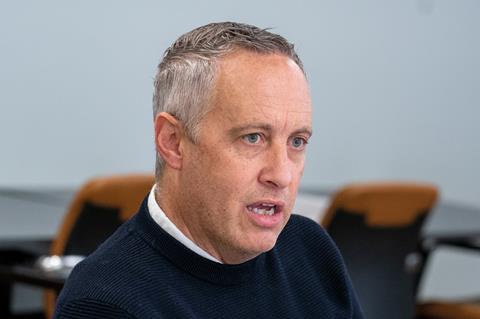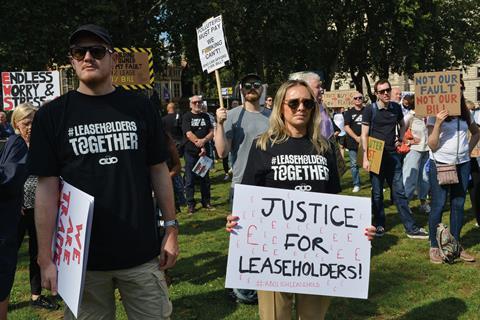Average house prices are falling – just one of many developments piling pressure on residential conveyancers. Eduardo Reyes reports
The proportion of owner-occupied homes in England and Wales has steadily fallen since the start of the century. Yet residential property prices remain core to our sense of economic wellbeing and confidence. If you recently bought or sold a property, the number of your neighbours who check out the price you paid or got is not zero.
But the conveyancing transactions that underpin this most British of parlour games have now been under heavy strain for a sustained period. Residential conveyancing has proved an increasingly stressful part of the legal market for solicitors and their support staff. Transactions are more complex and demanding than ever, yet too often clients, lenders and agents take the role of the lawyer for granted – an indifference reflected in fees that remain stubbornly low.
Staff and partners
Retaining conveyancers is a problem for firms. Birmingham-based sole practitioner Sarah Dwight, a member of the Law Society’s property law section executive committee, notes: ‘I know that many very experienced conveyancers are choosing to leave the profession.’
Andy Roscoe, partner at London and Surrey firm Meaby & Co Solicitors, says: ‘It’s still hard to find good-quality conveyancers.’ The picture has improved slightly in the past year, he notes, but adds: ‘It seems easier to recruit at partner level than associates or senior associates. Part of the problem is that some firms seem to promote legal assistants and paralegals too quickly, resulting in an inexperienced and unready “fee-earner”.’

He notes another new feature of the market: ‘The consultancy model sees lots of conveyancers with only a few months’ PQE effectively branching out on their own with limited supervision.’ This is a concern, he explains. ‘I’m PQE10. I’ve been in conveyancing for 20 years and I’m still learning, so I couldn’t feel comfortable taking on someone who hasn’t really been supervised much beyond their first PQE year and feel that they really know the job.’
Ungrasping the nettle: leasehold
The government has backtracked on sweeping reforms to the leasehold regime, which might have ushered in a different default ownership model.
But there are certain areas that need urgent attention, conveyancing solicitors argue. Linda Kirk of Adkirk Law says there are a few issues that must be prioritised. ‘Doubling and excessive ground rents should be high, if not first, on the government’s agenda for leasehold reform,’ she says. ‘These have arguably been the biggest headache for leasehold owners, and there should be legislation introduced to cap ground rents for existing leases, as well as restricting new leaseholds to peppercorn ground rents.’
Similarly, Kirk says the government should introduce legislation to limit how much can be charged for notice fees and administrative charges. ‘I am regularly dismayed at how much management companies are charging for providing LPE1 forms or receiving notice of assignments, and buyers are regularly unaware of these costs and have not budgeted for them,’ she notes.
Andy Roscoe of Meaby & Co Solicitors would support such attention. ‘I would like to see restrictions imposed on managing agents and freeholders in respect of how much they can charge for LPE1’s/pre-assignment packs,’ he says. ‘Also notice fees/deeds of covenant, and how long they can take to respond to enquiries. There are some larger managing agents who are consistently difficult to deal with, if not actively evasive, and this can delay transactions and post-completion work.’

HM Land Registry
An element of conveyancing beyond the control of solicitors is the performance of HM Land Registry (HMLR). ‘The current delays at HMLR are causing major problems for conveyancers, particularly with new-build properties and new dispositionary leases,’ says Peter Rodd, consultant at Kent firm Boys & Maugham and member of the Law Society property section executive committee.
Long delays, Rodd says, mean that buyers are unable to remortgage or sell the property as they are not registered as the proprietor. He warns: ‘Solicitors acting on such transactions run the risk that a requisition is raised which they cannot answer without assistance from the developer or their solicitor – and the former may have gone into liquidation in the intervening period.’

Dwight notes: ‘Although it is possible to have an application expedited at the Land Registry on the basis of financial hardship, or that the application impacts another application, it would seem that a lot of applications are expedited meaning that the backlog continues to grow.
‘There is no consistency with the way applications are dealt with as some applications are outstanding for more than two years, whereas others are coming back within a matter of days.’
‘The Land Registry seems open to new technology and new ideas, so that’s a positive,’ Roscoe concedes, but adds: ‘I do feel that they’ve got their priorities wrong. We do still have some new-build applications that were submitted in 2021 and are yet to be completed, so it really feels that they should be concentrating on their backlogs before discussing new tech such as the “simultaneous settlement platform”.’
'The current delays at HMLR are causing major problems for conveyancers, particularly with new-build properties and new dispositionary leases'
Peter Rodd, Boys & Maughan
The backlogs are causing significant issues for clients, such as not being able to sell or remortgage until their registration is complete. And, of course, there are problems for solicitors. ‘It’s understandably hard for clients to see how their property still hasn’t been registered and not to think that we must be trying to hide our own mistakes or delays,’ Roscoe adds.
Lenders, he says, regularly chase solicitors for updates ‘and threaten us with removal from their panels if we don’t update them monthly. When HMLR do get round to processing the application, they may raise requisitions which are very difficult to resolve 18 months down the line’.
Roscoe says HMLR requisitions are very inconsistent: ‘It’s very difficult to pre-empt what they may flag as being missing, incomplete or outstanding.
‘A working relationship with the local HMLR caseworker is no longer a thing as it was 10 years ago.’ Why? ‘HMLR tend not to call us regarding straightforward requisitions as they used to, or provide direct email addresses or phone numbers.’
Leasehold reform
‘There has been widespread criticism of the government’s change of direction on scrapping the leasehold system,’ notes Linda Kirk, director and head of residential conveyancing at Adkirk Law, Preston.
But, as a practitioner, she sees merit in such hesitancy. ‘I would argue that the decision to fix the system rather than overhaul it completely is actually a case of the government coming to its senses,’ she continues. The leasehold system, Kirk argues, does not need a complete overhaul or replacing with another ownership model: ‘Introducing commonholds could be disastrous, as lenders do not like them, and they would only see the costly overheads currently attached to leaseholds replaced with fees payable to management companies.’
Freeholds, she believes, would land owners with substantially more financial and legal liabilities: ‘I think people have been too quick to forget that leaseholds did, for a long time, work well for the most part. Taking a piecemeal approach to fixing the system rather than replacing it has a lot of potential, provided the government approaches it in the right way.’
There are, Roscoe notes, more urgent problems to address within leasehold. ‘There needs to be an urgent change to the Building Safety Act in respect of lease extensions,’ he says. ‘At present, a lease extension removes any protection that the leaseholder may have had against the costs of building safety or fire safety remediation work. Leaseholders have a choice to make between extending their lease or protecting themselves against remediation costs. There is an amendment going through the legislative process at present, but it’s yet to be agreed and is anything but certain.’
Economic crime
The government’s strategy and supporting measures on tackling economic crime continue to evolve – part of a picture of increasing complexity for conveyancing solicitors, Rodd notes.
‘The conveyancing process has become more and more complicated over the years,’ he says. ‘Fraud and anti-money laundering have considerably increased the risk while the Economic Crime (Transparency and Enforcement) Act 2022 and the Building Safety Act 2022 have created further challenges resulting in many conveyancers opting out of certain types of work.’
'Agents are more pushy, almost desperate to get transactions completed… There does not seem to be an appreciation by agents that the work we are doing is becoming more challenging and risky and that quick answers are not always appropriate'
Sarah Dwight, sole practitioner
More and more responsibility is being put on the conveyancer, Rodd points out ‘making the process more complicated and lengthy’.

Demands are also growing in the context of an uncertain economic outlook, which brings its own problems, Dwight notes. ‘As the market appears to be dipping, I am finding that agents are more pushy, almost desperate to get transactions completed,’ she says. ‘This can influence how clients react and so the volume of emails remains high. There does not seem to be an appreciation by agents that the work we are doing is becoming more challenging and risky and that quick answers are not always appropriate.’
Roscoe reports a mixed picture when it comes to client, agent and lender conduct. ‘The expectations of most clients and estate agents remain reasonable, as ever,’ he says. ‘But the post-lockdown “be kind” era is well and truly over for some.
‘I’ve handled a lot more files recently with unreasonable expectations. But to be fair to most clients and agents, that usually comes from one difficult buyer, seller or agent and spreads through the chain.’
Transactions, he notes, ‘are definitely moving more slowly than they were, say, five years ago. This is resulting in a fair degree of unrest among clients and agents’. In addition, he says: ‘There is a general lack of understanding among many clients and agents about what we conveyancing solicitors do.’
Fees
'Most firms probably don’t charge enough – but who is brave enough to increase fees and create an even wider gap between themselves and the firms who come up when you Google "cheap conveyancing"?'
Andy Roscoe, Meaby & Co
The financial reward for taking on ever more challenging and risky work is, Rodd says, ‘totally inadequate’.
‘We increased our fees temporarily during the SDLT holiday in 2021 due to the sheer demand,’ Roscoe relates, ‘but decided to keep them at that level since then as it better reflected the work done… Most firms probably don’t charge enough – but who is brave enough to increase fees and create an even wider gap between themselves and the firms who come up when you Google “cheap conveyancing”?’
The ‘race to the bottom’ on fees ‘seems to be back on for some firms’, Roscoe notes. The result is that ‘it becomes difficult to justify our fees sometimes, even though we firmly believe that we’re worth what we charge, and can prove that with client reviews… To a first-time buyer or a family on a tight budget, the extra £1,000-£1,500 that we might charge over a “factory conveyancer” may be the difference between a new oven, fridge and washing machine or going without’.






































2 Readers' comments